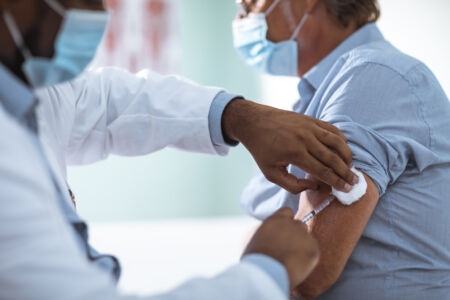
Traveling in the age of COVID-19 requires knowing the risks, even after receiving the vaccine. But if you have varicose veins, you need to take extra precautions.
As the U.S. ramps up its vaccination efforts, booking that long-postponed trip is finally becoming a reality. According to the Centers for Disease Control and Prevention, roughly 52 million adults, or 15.5 percent of the population, have received two doses of a COVID-19 vaccine. About 94 million (or 28.2 percent) have received one shot. Nearly 50 percent of people age 65 and older are now fully vaccinated. In the coming months, more people of all ages will be vaccinated.
The FDA-approved vaccines currently being distributed have shown to be above 90 percent effective in stopping COVID-19 infection in those who haven’t been previously infected. More importantly, if you become infected, the vaccines make it less likely you’ll require hospitalization or suffer severe disease. With all these positive trends, traveling is safer than it was a year ago. Yet if you have varicose veins, you have to take into account not only COVID-19 considerations, but how to take care of your veins when you travel, as well. Here’s what you need to know.
Traveling in the Age of COVID-19 with Varicose Veins
First, the good news: two weeks after your second vaccine dose, you stand a greatly reduced chance of contracting the virus. So, it’s probably safer to travel or visit with a small group of relatives who have also been vaccinated. However, experts still recommend wearing a mask and maintaining social distancing measures to protect vulnerable people from becoming infected. Although you may be fully vaccinated, you could still transmit the virus even if you don’t have symptoms. But there is some encouraging news on that front: a study in Israel found that the Pfizer vaccine cut down on transmission by 90 percent.
Further, states and countries (especially some European countries) may have guidelines regarding whether you need to show proof of your vaccination to enter, or if you need to take a COVID-19 test or quarantine after arriving. Before leaving, check for any COVID-19 restrictions in your destination.
If you are fully vaccinated — defined as two weeks following the second dose — you can finally start making those travel plans. As you book your trip and map out your itinerary, take these four precautions to protect your varicose veins from becoming more painful during the trip.
Wear Compression Stockings. Spending long hours seated in a car or on a plane narrows blood flow in the legs, which only swells varicose veins even more and makes them more uncomfortable. Long plane rides also increase the risk of deep vein thrombosis, a potentially dangerous blood clot in the leg vein. But you can counteract those negatives by slipping on a pair of compression stockings. These tightly woven socks gently compress the veins so blood flows smoothly and doesn’t pool in the vein. Compression socks are widely available in drugstores or by a doctor’s prescription for the strongest pressure.
Move Around. Whether driving in a car or on a plane ride, take frequent breaks to walk around. By working your calf muscles even for a short interval, you help the muscles support the veins in pumping blood. Consider reserving a plane seat with plenty of legroom. This will allow you to stretch your legs and flex your ankles, which promotes good circulation.
Stay Hydrated. Plane travel can be especially dehydrating because of the air pressure in the cabin. Add to that the temptation of salty snacks and sugary drinks, and your body will be sapped of water by the end of the plane ride. Your veins need water to maintain proper blood flow. So when on the plane, avoid sugar-laden sodas and alcohol and sip only water instead.
Choose Comfortable Clothes. Tight-fitting clothes, particularly around the waist, restrict blood flow from the abdomen through the legs. When dressing for your trip, opt for casual, comfortable clothes. It’s not only better for your veins, but you’ll want to be as comfortable as possible during a long plane or car trip, as well.
Before you travel, you might want to consider a procedure to correct your varicose veins permanently, so you don’t have to worry about the pain and swelling acting up during the trip. A vein specialist can discuss one of several options. And be sure to take the vaccine when you have the opportunity. It will make your trip that much safer.
Time to Treat Your Varicose Veins?
Whether you’re planning a trip or not, it’s always a good idea to meet with a vein specialist about your varicose veins. Center for Vein Restoration has offices around the country staffed by dedicated doctors who specialize in vascular disorders and their treatments. Contact us today for a consultation.